Jude Knight's Blog, page 126
October 28, 2016
Counting the bastards
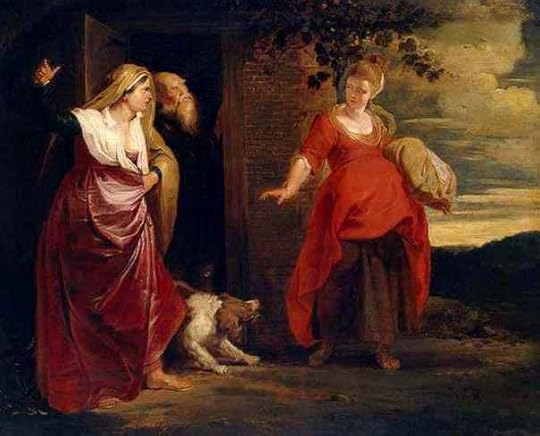 A sub-theme of my Revealed in Mist is illegitimacy, and the way that illegitimate children were regarded in Georgian and Regency England. I’m conscious that we see that period through the lens of the Victorian era, as I’ve comment in the article on rakehells I wrote for Dirty Sexy History. I figured I’d better do some research, and — of course — I got sucked in.
A sub-theme of my Revealed in Mist is illegitimacy, and the way that illegitimate children were regarded in Georgian and Regency England. I’m conscious that we see that period through the lens of the Victorian era, as I’ve comment in the article on rakehells I wrote for Dirty Sexy History. I figured I’d better do some research, and — of course — I got sucked in.
Births per women, the number of children born within eight months of the wedding, the percentage of women never married, and maternal mortality rates all turned out to be relevant. No, really.
Uncovering the secrets
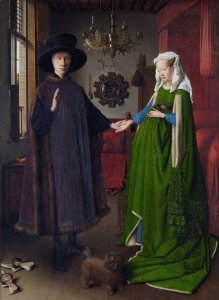 Genealogists have done some useful research on the percentage of children born outside of wedlock or in the first few months after a wedding. The second is simply a matter of dates, and in the early 19th century, around a third of brides were already carrying when they made their vows.
Genealogists have done some useful research on the percentage of children born outside of wedlock or in the first few months after a wedding. The second is simply a matter of dates, and in the early 19th century, around a third of brides were already carrying when they made their vows.
The first is usually clear enough, too. From a level of two children out of every hundred, the rates rose over the long 18th century until, in the early Victorian, seven percent of all children were illegitimate. (Of course, this doesn’t count those who had a legal father to whom they were not biologically related. DNA sampling in cemeteries suggests one in ten offspring are not related to the putative father.)
The birth or baptismal records might state the name of the father and the status of the child. Or perhaps the mother wouldn’t name the father, though such stubbornness could see her jailed. The local parish authorities, who were required to pay for the care of a child whose mother was a resident, had a vested interest in making sure that the man took his responsibilities seriously.
I dare say a number of those pregnant brides went to the altar to meet a groom constrained to be present by the local Vestry committee. And if the man could not or would not marry the girl, he was expected to pay a weekly amount until the child was seven, and could be apprenticed.
Of course, then as now, there were men who successfully denied responsibility, or who absconded. And, with urbanisation, the old village system, where everyone knew everyone else’s business, became less significant for most of the population. The cities provided greater opportunities for anonymity and escape, and fewer opportunities for social sanctions, so the rise in illegitimacy rates is hardly surprising.
Septicaemia as birth control
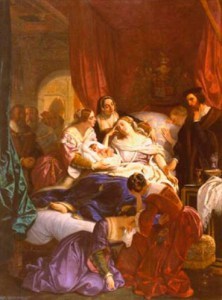 Now I needed to know average family size. After all, five percent in 1800 is only one in twenty, but how many families had an illegitimate child?
Now I needed to know average family size. After all, five percent in 1800 is only one in twenty, but how many families had an illegitimate child?
In 1800, women could expect, on average, five live births in their childbearing years. Several sites suggested this implied some form of contraception, and I think I’ve figured out what it was. Women had a twenty percent chance of dying in childbirth, which correlates in a horribly fascinating way. The most common way of limiting the number of births per women was maternal mortality.
We can’t say that the average family size was five children. The odds were slightly skewed because it seems likely that a third of women never married (although presumably some of those had children anyway). And fathers could and did take new wives and have more children.
Calculating average family size
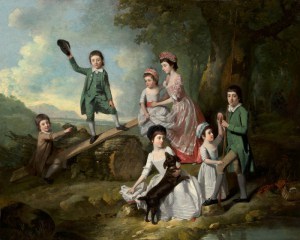 So let’s do it this way. [WARNING: If you are allergic to Maths, read no further.]
So let’s do it this way. [WARNING: If you are allergic to Maths, read no further.]
750 children would be born to 150 women. One hundred of those women would be married. Thirty-seven of those children would be born outside of marriage, so the remaining 713 children were born inside of marriage.
This gives us an average family size of around seven, and, in those hundred families, 71 children whose biological sire was not the father of record, and 34 who were conceived before the marriage but born within it.
Class differences in attitudes to illegitimacy
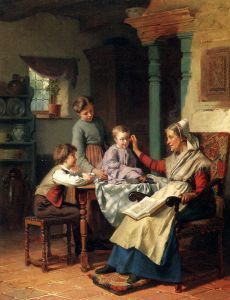 The idea that a woman with a bastard was damned forever and had no choice but to sell her body on the street is part of our Regency writer vocabulary, but it isn’t entirely accurate. The rural lower classes were more practical than that. A girl who was found to be pregnant, and without a lover willing to marry her, might be producing another mouth to feed, but in a few years that mouth would become a set of hands. Genealogy studies have found that unmarried mothers often married later on, their ‘mistake’ absorbed into the new family without a ripple.
The idea that a woman with a bastard was damned forever and had no choice but to sell her body on the street is part of our Regency writer vocabulary, but it isn’t entirely accurate. The rural lower classes were more practical than that. A girl who was found to be pregnant, and without a lover willing to marry her, might be producing another mouth to feed, but in a few years that mouth would become a set of hands. Genealogy studies have found that unmarried mothers often married later on, their ‘mistake’ absorbed into the new family without a ripple.
For the urban poor, forced to work in factories and workshops, babies were more of a problem. Many were cared for in baby farms, where the death rates were horrific.
The middling sort always set greater store by moral behaviour that those below and above them on the social scale. They tended to expect morality of their men and their women, so perhaps the daughter of a shopkeeper or a lawyer or a wealthy tenant farmer might expect her suitor to marry her if he anticipated his marital rights.
The double standard
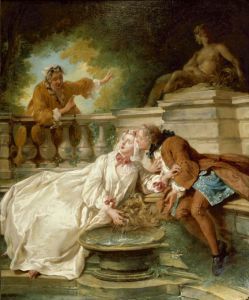 Not, though, if she were foolish enough or unfortunate enough to attract the attention of one of the upper sort. They had two sets of rules. If you’ve seen the movie Georgiana, you’ll remember the Duke of Devonshire, who had a series of mistresses he preferred to his wife, brought his bastard children to live in his house, and expected the duchess to be friends with the mistress who lived with them, and mother to the entire brood: hers and those of his lovers. Yet he was exceedingly miffed when she had an affair resulting in a child, and insisted that the child be given to its paternal grandparents.
Not, though, if she were foolish enough or unfortunate enough to attract the attention of one of the upper sort. They had two sets of rules. If you’ve seen the movie Georgiana, you’ll remember the Duke of Devonshire, who had a series of mistresses he preferred to his wife, brought his bastard children to live in his house, and expected the duchess to be friends with the mistress who lived with them, and mother to the entire brood: hers and those of his lovers. Yet he was exceedingly miffed when she had an affair resulting in a child, and insisted that the child be given to its paternal grandparents.
In some ways, little Eliza Courtney, Georgiana’s daughter, was fortunate. She went to relatives who were well able to care for her, though it seems she was kept very much in the background. She made a good marriage, and her descendants include Sarah, Duchess of York. Other noble bastards were put into foster care with unwilling or careless carers, or they remained with their mothers, but only because the poor fallen ladies were turned from their homes.
Women were to be pure (or at least discreet). Men could do pretty much what they liked, as long as they were a little subtle about it.
In fact, reactions varied as much as families. Whatever you’ve read in a romance probably happened somewhere.
For a linked topic, see my post this week on Jessica Cale’s Dirty Sexy History: The Rakehell in Fact and Fiction








October 26, 2016
Opening and ending hooks on WIP Wednesday
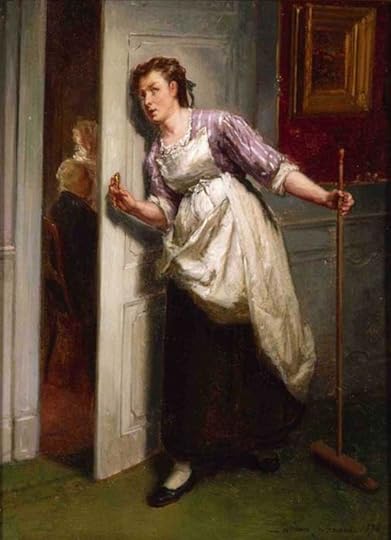 I tend to write drafts in scenes, then decide later where the chapter breaks go. This means that at edit stage I need to find page-turning line to end a chapter on, and an enticing line to begin the next. Or I need to write one.
I tend to write drafts in scenes, then decide later where the chapter breaks go. This means that at edit stage I need to find page-turning line to end a chapter on, and an enticing line to begin the next. Or I need to write one.
We call these hooks. They catch on the readers’ mind, and then we reel them in.
This week, I’m looking for your hooks. Give me an excerpt that makes me want more. Here’s one of mine, from Revealed in Mist.
She transferred the contents of the tray to a table beside Miss Diamond’s chair: the pot, a cup, a plate of neatly sliced ham, cheese, pickles, and bread, and a plate of tiny iced cakes. Madame watched and Miss Diamond sat compulsively eating one marzipan shape after another. “That will be all,” Miss Diamond said. “Dupont will serve me.”
Dupont followed Prue across the room and closed the door firmly behind her.
Would there be time to get into the book room while they were occupied? She could at least find out whether she could easily pick the lock with the tools she had been carrying in her apron pocket all afternoon.
She had just taken them from her pocket and bent to examine the lock when a loud scream from below sent her jerking upright then plunging back downstairs.








October 24, 2016
Tea with Nicholas
Lord Nicholas Lacey hesitated at the threshold to Her Grace’s salon. The appointed hour had at last arrived when his hostess agreed to meet with him. However, Nicholas felt like a misbehaving school boy about to be reprimanded for some silly childhood prank. His cravat, of a sudden, seemed entirely too tight about his neck giving him reason to have a word later with his valet about learning the technique of tying a proper knot.
He gave the cloth a slight tug and raised his hand to the door before him, only for it to open as though the servant on the other side knew he was present.
“Lord Nicholas, you are right on time I see. I do so appreciate punctuality,” the Duchess of Haverford declared from her place before the fireplace.
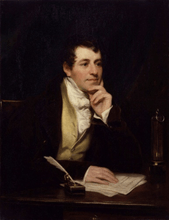 Nicholas stepped into the room as the servant closed the door leaving him alone with his hostess. “You are kind to see me at such short notice, especially with your home full of other guests.”
Nicholas stepped into the room as the servant closed the door leaving him alone with his hostess. “You are kind to see me at such short notice, especially with your home full of other guests.”
“Do come in and join me for a cup of tea,” Her Grace bid with a wave of her hand to the empty seat across from her, “or will we need something stronger to fortify us for the conversation ahead?”
Nicholas might, indeed, need something stronger than tea but he refrained from her suggestion. He needed to keep his wits together. “I have a most unusual request that involves another here at Hollystone.”
The duchess perused him most thoroughly before a hint of a smile escaped her. “And which one of the lovely ladies present is this regarding, Lord Nicholas?” she asked pouring a cup of tea and handing it to him.
“Grace… Lady de Courtenay,” he answered taking a sip.
She watched him carefully over the rim of her own cup before she set the china back down upon the trolley. “Your intentions are honorable, are they not?” she inquired in a tone that implied much.
“Yes, of course, Your Grace. I have only the utmost respect for Lady de Courtenay.”
The duchess picked up her tea again and took another sip. “Good. Then tell me how you met your lady and why you have asked for this meeting. I do so enjoy a good love story.”
Nicholas relaxed into his chair as memories of Grace ran across his mind. “It all began with a kiss…”
Lord Nicholas Lacey is the hero in Sherry Ewing’s novella, A Kiss for Charity from the Bluestocking Belles’ holiday box set Holly and Hopeful Hearts.
Young widow, Grace, Lady de Courtenay, is more concerned with improving her mind than finding another husband. But how was she to know that a close encounter with a rake at a masquerade ball would spark her interest and make her yearn for love again?
Lord Nicholas Lacey has been on his own for far too long after losing his wife in a tragic accident. After a rare trip to a masquerade, his attention is captivated by a lovely young woman. Considering the dubious company she keeps, perhaps she might be interested in becoming his mistress…
From the darkened paths of Vauxhall Gardens to a countryside estate called Hollystone Hall, Nicholas and Grace must set aside their differences in order to let love into their hearts. It will take more than a dose of holiday cheer to see these two on the road to finding their happily-ever-after and a kiss for charity may just be what they both need.
About Sherry Ewing
Sherry Ewing picked up her first historical romance when she was a teenager and has been hooked ever since. A bestselling author, she writes historical and time travel romances to awaken the soul one heart at a time.
Website and Blog: http://www.SherryEwing.com
Facebook: https://www.facebook.com/SherryEwingauthor
Twitter: https://www.twitter.com/Sherry_Ewing
Pinterest: http://www.pinterest.com/SherryLEwing
BUY LINKS for HOLLY AND HOPEFUL HEARTS
Amazon US: http://ow.ly/INwa3049Ey3
Amazon UK: http://ow.ly/ZMuH3049ELM
Amazon Australia: http://ow.ly/TczG3049EQ2
Amazon Canada: http://ow.ly/IERm3049EYM
Smashwords: https://www.smashwords.com/books/view/664559
Kobo: http://ow.ly/Vx1n304jGzj
Barnes & Noble: http://ow.ly/LqCI304jGuS
iBooks: http://ow.ly/JcSI304jGWE








October 23, 2016
Building a village
 A couple of weeks ago, I wrote the arrival of my hero and heroine of A Raging Madness at the tumble-down Renwater Grange, the estate gifted to Alex by a grateful king. They woke up the next morning, went for a walk to investigate the stables, and met the husband of their temporary housekeeper. And then I got stuck.
A couple of weeks ago, I wrote the arrival of my hero and heroine of A Raging Madness at the tumble-down Renwater Grange, the estate gifted to Alex by a grateful king. They woke up the next morning, went for a walk to investigate the stables, and met the husband of their temporary housekeeper. And then I got stuck.
 I knew where the house was; in the village of Renbridge, in the Lincolnshire dales. I’d done quite a bit of research about agriculture and horse breeding in the dales, and the type of land ownership and architecture. But who lived in Renbridge? What were their names, their characters, their habits and their interrelationships?
I knew where the house was; in the village of Renbridge, in the Lincolnshire dales. I’d done quite a bit of research about agriculture and horse breeding in the dales, and the type of land ownership and architecture. But who lived in Renbridge? What were their names, their characters, their habits and their interrelationships?
I realise that most of the villagers won’t have a mention in the book, and that even those who wriggle their way into the first draft might be cut in the second. But I have no idea which ones are a permanent part of the story, and—in any case—their existence, mentioned or not, is texture in the background. Who are these people?
So for the past fortnight, I’ve been writing a village. I thought you might like to see the raw results.
Renbridge village
10.2 miles from Horncastle, 6.9 miles from Louth, 8.7 miles from Alford
The church and rectory
 The church is St Ninians, the living is at the gift of the King as Duke of Lancaster. The Rector is Reverend Daniel Morris, a single man, an elderly widower with no children. His housekeeper is Mrs Kelk, wife of his handyman and general servant. He also has an all purpose maid, Aggie Nevis. Mr Morris (74), Kelk (56), Mrs Kelk (57) (the five Kelk children are all gone — two dead as children, a boy and a girl, one married and in Alford, one in the army, and one in the US after a run in with the law). Aggie (48) never married, has been with the living longer than the others.
The church is St Ninians, the living is at the gift of the King as Duke of Lancaster. The Rector is Reverend Daniel Morris, a single man, an elderly widower with no children. His housekeeper is Mrs Kelk, wife of his handyman and general servant. He also has an all purpose maid, Aggie Nevis. Mr Morris (74), Kelk (56), Mrs Kelk (57) (the five Kelk children are all gone — two dead as children, a boy and a girl, one married and in Alford, one in the army, and one in the US after a run in with the law). Aggie (48) never married, has been with the living longer than the others.
Mr Morris is kindly, scholastic, and sharp as a tack. Very social, has a lovely little dog that he takes walking. He is a classics scholar with a speciality in Republican Rome and takes students. One is currently living across the road with the Mullens.
The inn
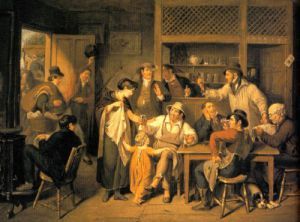 Innkeeper is Silas Hancock (48), and his wife Betsy (46). They have grown sons and a daughter who also work at the inn. Sons are Fred (27), Sam (25) and Dick (19). Their daughter is Mattie (19). Four children died between Sam and Dick, two during a village cholera epidemic, one of smallpox, and one in an accident. Dick and Mattie are twins. Also various servants who may or may not get names. Fred manages the stables with Dick’s help. Silas is mine host. Betsy and Mattie rule the kitchen. Mattie is being courted by a farmer’s son. Inn has been in the Hancock family for generations.
Innkeeper is Silas Hancock (48), and his wife Betsy (46). They have grown sons and a daughter who also work at the inn. Sons are Fred (27), Sam (25) and Dick (19). Their daughter is Mattie (19). Four children died between Sam and Dick, two during a village cholera epidemic, one of smallpox, and one in an accident. Dick and Mattie are twins. Also various servants who may or may not get names. Fred manages the stables with Dick’s help. Silas is mine host. Betsy and Mattie rule the kitchen. Mattie is being courted by a farmer’s son. Inn has been in the Hancock family for generations.
The inn, church, and grange are on the Y intersection.
Cottages on the road to Alford

Mirs Rycroft lives in a substantial detached cottage.
On the road to Alford between the church and the grange are three cottages, all detached. On the east of the road, next to the rectory, is the Fox house, then Widow Bycroft’s cottage, then the bridge over the Ren. On the west of the road next to the bridge is the Broadley cottage. The rest of the west is grange land.
The Fox family is large and unruly. Jeb Fox (35) is a drunkard and a lout. He does farm labour when he can get it, but most of the farmers around will only use him if they have to, as he cannot be relied on. Pansy Fox (28) takes in washing, cleans, and (it is rumoured) supplements her income by lifting her skirts. Fox beats her when he suspects such a thing, and so her lovers are circumspect, but she has 7 children to feed, and those are just the survivors. She has buried 4, two in the same cholera epidemic as the Hancocks. The children are one a year, 11, 10, 9, 7, 6, 3, 1, with the dead ones fitting in the gaps. She is pregnant again. Not all of the children look like her or Fox.
The widow, Harriet Rycroft (61) lives in a house that is slightly more substantial than a cottage. She and her maid of all work and dear friend, Jane Harper (59), came here from far away and have lived quietly in the village for 25 years. The villagers would be surprised to know that they are retired prostitutes. They often give work to Pansy Fox, but pay her in food and clothing. Mrs Rycroft runs a dame school for the village children.

A visual reference for Renwater Grange
The Broadleys are both from families that have long been in the area. Jack Broadley (47) is a farm labourer, a large quiet man that will turn his hand to most things. Because work is scarce in the area and farmers can usually take their pick, it is significant that he is usually among the first chosen. Bee Broadley (Phoebe, 43) is Silas Hancock’s sister. She has been hired as temporary housekeeper at the grange, and is the first person Alex and Ella meet when they arrive. The Broadleys have one son (John, 24), who was impressed by the navy but who loves the life, and a daughter (Molly, 22) who has married a local farmer.
A row of cottages on the road to Horncastle
 On the road to Horncastle, the grange takes up the northwest side of the road, and there is a row of three cottages on the southeast, with the Roses, Mullens, and Pecks.
On the road to Horncastle, the grange takes up the northwest side of the road, and there is a row of three cottages on the southeast, with the Roses, Mullens, and Pecks.
Bill Rose (67) runs the village shop, with the support of his two daughters, Martha (34) and Jemima (32). His wife died when the girls were teens. Bill’s son Willy married and moved away years ago. Willy is horse mad, used to work in the inn stables, and took a job to be closer to horses. The innkeeper, Bill, is in failing health and Willy wants to be closer, so will apply for job as stable master. Bill has chased off any suitors for his daughters, so they are still single. They are involved in all village activities, especially church activities.
George Mullen (27) and his wife Millie (20) are newly weds. He is a farm labourer, son of farm labourers from another village closer to Alford. She is the daughter of Mr and Mrs Hewitt, who live further along the road. They can only afford the cottage because they have a gentleman boarder, a scholar who is studying with Mr Morris. He is a young man who hopes to take religious orders, which will work better if he can keep his eyes of Mattie Hancock. Peregrine Fairweather (23) is the second son of a family of comfortably situated gentry, and a nice enough young fellow.
Matthew Peck (56) and his two sisters Katie (57) and Pauline (59) live in the last cottage on the way out of the village. Matthew is a farm labourer. Katie and Pauline do piece work for a dressmaker in Hardcastle.
Cottages on the road to Louth
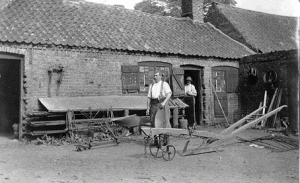 Leading out of the village to the east on the Louth road, the Arnotts and the Hills are on the north side in detached cottages.
Leading out of the village to the east on the Louth road, the Arnotts and the Hills are on the north side in detached cottages.
Charlie Arnott (48) is the village smith, and also the verger. His father, also Charlie (78) was both of these things before him but is now suffering from dementia. His mother Maggie (67) looks after Charlie and also helps with the house and children. Charlie is a widower, his wife having died in childbed some 10 years ago, leaving four children: Charles Jnr, who is 19 and his father’s apprentice, Becky (16), Tom (14) and Ben (12).
Nathan Hill (34) and his wife Lucy (28) live in the eastmost cottage with children Fanny (6), Jenny (4), Ninian (2), and Lucy is heavily pregnant. Nathan is a carpenter and general handyman. Lucy spins, sews, and makes bonnets to supplement the family income.
The remaining villagers, the Woods, Farrows, Hewitts, and Dodds, live in the row of cottages on the south side of the Louth road.
Moses Wood (46), the carter, is married to Hester (39). They have one son, Aaron, who is in the army (22). Hester is a baker at the inn.

There’ll be work for bricklayers and carpenters up at the Grange
Tim Farrow (36) is a farm labourer living with his mother, Alice Farrow (61). He was a rival for Lucy Hill’s hand and has been miserably single ever since. Jemima Rose has hopes of him, but he hasn’t noticed.
Ted (62) and Mary (61) Hewitt are the parents of a large brood, mostly dispersed. Millie is the youngest, and recently married George Mullen. They also have 3 sons and 2 other daughters, as well as 2 who died as children. The eldest is Eddie, 34, an assistant stable master in Hardcastle. Mary-Kate (31) is married to one of Alex’s tenant farmers. Suzy (27) went into service and is now assistant housekeeper for a baron near Lincoln. Twin brothers Wally and Bart (23) both live at home and are farm labourers with their father. Mary helps out at the inn.
Gabe Dodd (38) and his wife Abbie (35) live in the last cottage on the road to Louth. They have three children, Matthew (10), Mark (7), and Luke (4). Abbie has just discovered that she is with child again, but has not yet told anyone because she is prone to miscarriage. Gabe is a builder/bricklayer.
Five farms pay rental to Alex
 Jerry Ashton (62) and his wife Agnes (58) are Lucy Hill’s parents. They also have two sons who work the land with their father, Frank (34) and Harry (31). Both are married, Frank to Nan (28) – two small children, 5 and 3—and Harry to Dinah (27, and Nan’s sister)—two small children, 3 and newborn.
Jerry Ashton (62) and his wife Agnes (58) are Lucy Hill’s parents. They also have two sons who work the land with their father, Frank (34) and Harry (31). Both are married, Frank to Nan (28) – two small children, 5 and 3—and Harry to Dinah (27, and Nan’s sister)—two small children, 3 and newborn.
Jonas Catchpole (43) and his wife Clara (46) live with Clara’s elderly parents (Seth 74 and Mary 71). Their one daughter is married to Rafe Bracey. They have a live-in farm worker, Johnny Harper (32) who had hoped to marry Rachel himself.
Billy Horrell (52) is a widower with two grown sons. William (28) is single and Henry (25) recently married Molly Broadley
Rafe Bracy (33) is married to Rachel (21), the daughter of the Catchpoles. Rafe and Rachel live with Rafe’s brother Mike (35), who is a widower with two small children (7 and 3). Rafe was in the army, but returned home when his brother’s wife Mary died.
Ambrose West (39) lives with his sister Heloise (37). He is sweet on Martha Rose, and has been since they were children. Their mother was gentry who married down. She is a doddery old woman of 66, who sews by the fire and occasionally discomforts people by noticing what is going on. They hire their farm labour from the village.








October 21, 2016
From brothel to pirate queen to successful business woman
 In the early 19th century, ships traversing the China Sea faced a most unusual band of pirates: unusual because of the size of the fleet, its impeccable organisation, strictly enforced rules, and the nature of its leader. For ten years, the woman known to us as Widow of Zheng was the power to be feared, not just by any passing ship but by her pirates, the Red Flag Fleet.
In the early 19th century, ships traversing the China Sea faced a most unusual band of pirates: unusual because of the size of the fleet, its impeccable organisation, strictly enforced rules, and the nature of its leader. For ten years, the woman known to us as Widow of Zheng was the power to be feared, not just by any passing ship but by her pirates, the Red Flag Fleet.
It all began in 1801 when the pirate leader Zheng Yi fell in love with a girl he captured from a brothel. She agreed to marry him, but only if he would make her his business partner. It was wise move on his part—she proved to be an organising genius, and by 1804 the couple had formed a coalition of pirates into a fearsome fleet, eventually reaching 1800 ships and around 60,000 pirates (this included supply ships).
When Zheng Yi died in a typhoon in 1807, his widow, Zheng Shi, took over as the new leader, keeping his second in command and adopted son, Chang Pao, as her own second and her lover. The fleet and her fame grew, and Zheng Shi not only took loot and collected ransoms from any ships the fleet captured, she also controlled a long line of coastal villages, collecting taxes.
 She set up strict rules for her fleet. Any loot had to be presented to the common fund. The collecting ship was given 20% and the rest went into the pool to be shared amongst the rest of the fleet. Anyone failing to share would have their head cut off. Anyone disobeying her orders would have their head cut off.
She set up strict rules for her fleet. Any loot had to be presented to the common fund. The collecting ship was given 20% and the rest went into the pool to be shared amongst the rest of the fleet. Anyone failing to share would have their head cut off. Anyone disobeying her orders would have their head cut off.
She had special rules about female captives. A rapist had his head cut off. Pirates could take their pick of pretty captives, but would have to marry the woman they chose and then be kind to her and faithful, or have their heads cut off. (Ugly women were to be set free.)
First time deserters lost their ears. If they deserted again, they had their heads cut off.
The Chinese Government found it impossible to stop this fearsome woman and her pirates, even with help from the Portugese and the British. In the end, the Chinese offered an amnesty. Zheng Shi sent Chang Pao to negotiate the best deal he could, and when negotiations broke down she took over herself. Her fleet won not just the amnesty, but the right to keep their loot. Most of the pirates walked free, and Zheng Shi received a cash bonus. Chang Pao was commissioned as an officer in the Chinese navy, and set out to become the scourge of the pirates who had formerly been the Red Flag Fleet’s rivals.
Zheng Shi married Chang Pao, opened a gambling house (and some say a brothel), and settle down to have Chang Pao’s son and remained a wealthy and highly respected business woman until her death at the age of 69.
Not that I’m advocating piracy as a career move, but I quite like the fact that arguably the most successful pirate in the history of the world was a woman.








October 19, 2016
Tender moments on WIP Wednesday
After several weeks of focusing on mayhem, I’m taking a gentler theme this week. Give me your tender moments. Perhaps between your hero and heroine, perhaps not. Two friends? A mother and child? Show me what you’ve got, and I’ll show you mine — this is from A Suitable Husband, one of my stories in Holly and Hopeful Hearts, and features my heroine in a vulnerable moment, being comforted by two friends. None of them know that my hero is listening at the door.
“Do not cry, Cedrica. You are doing wonderfully well, and the duchess knows it. Lady Stanton will receive no support there.”
Cedrica? That cold-hearted bitch had upset his Mademoiselle?
“I agree with Grace, Cedrica. Aunt Eleanor shall give one of her deadly little set downs, and I should dearly like to see it. Here. Dry your eyes, darling. It shall all be well, you will see.”
Then Mademoiselle’s voice, trembling with unshed tears. “You are right. I know you are. I do not know why I allowed her to upset me so. Only… I am just so tired of stupid conflict. This gentleman does not want to share a room with his wife. That one has kept every guest in his wing awake with his snoring. This lady cannot have the same breakfast as that one, and another must be served the identical tray, right down to the colour of the inlay. And as for the war between the kitchens! I swear, if I have to referee one more battle over who has first use of the lemon zester, I shall scream.”
Really? She was not enjoying their little dramas as much as the two combatants? Marcel frowned, and shot a glance both ways down the hallway to make sure he was not observed as he leant closer.
The two other ladies were making soothing noises, and offering to take up Mademoiselle’s duties while she rested.
“No, no. Aunt Eleanor would be so disappointed in me. Besides, you have your own tangles to straighten. Making sure that Lady Stanton and her cronies are not in a position to bully Miss Baumann, that Lord Trevor is dissuaded from taking out a gun, since he cannot see beyond the end of his arm and refuses to wear glasses, and that Lady Marchand can only cheat at cards with those who know her little ways.”
The three ladies laughed together, Mademoiselle’s chuckle still a little watery.
Her voice was forlorn when she said, “It was the other that hurt most, you know. Because it is true.”
More soothing noises, which she rejected.
“No. I am not a fool. I know that I have dwindled into an old maid. Well, look at me. Plain ordinary Cedrica Grenford. A useful person to have on a committee, but not one man has ever looked at me twice nor is likely to. I know Aunt Eleanor thinks dressing me up like a fashion doll and sending me in to talk to all these lords will turn me into a… a swan. But I am just a plain barnyard hen when you come down to it.”
Lady de Courtenay disagreed. “Oh but surely Lord Hythe—”
Another heart-wrenching chuckle. “See, his sister is shaking her head. And you are right, Sophia. Hythe is polite to everyone, and kind to me because I was at school with Felicity. He treats me as a lady, which is nice of him when I am, as Lady Stanton so kindly pointed out, merely hanging onto gentility by the charity of Her Grace.”
“Oh Cedrica…” That was both ladies. Marcel’s response to Lady Stanton’s cruel words would have been much more forceful.
“He does not look at me and see a woman. No one does.”
Lady Sophia spoke decisively. “You are blue-devilled, my dear. Who knows whether any of us will meet a man who can see past our elderly exteriors to the treasures we all are? And if we do not, you and I shall be old maids together.”
“Yes,” Lady de Courtenay agreed. “Perhaps we should set up house together? Certainly Sophia and I have no more wish to live forever on the sufferance of our brothers than you do on the Haverfords. Who needs men, after all? Selfish, conceited creatures, always jumping to conclusions.”
This time, Mademoiselle’s laugh was more genuine.
Lady Sophia said, “Rest for an hour. Read a book. I will order a pot of tea and some cakes, and Grace and I shall deal with anything that arises.”








October 17, 2016
Tea with Georgiana
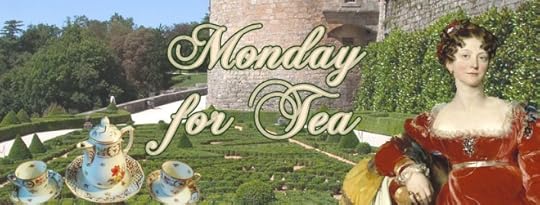 Georgiana, the widowed Duchess of Darby, greets the Duchess of Haverford with a carefree smile even though her insides are fluttering about like the autumn leaves falling from the plane trees outside. The duchess has been her friend and mentor since the early days of Georgie’s marriage, proclaiming herself an honorary aunt, but she is far too perceptive and she is sure to notice Georgie’s unease even though this is just a morning call. But will she know why? Of course, Aunt Eleanor is much too dignified to pay any attention to salacious gossip… isn’t she?
Georgiana, the widowed Duchess of Darby, greets the Duchess of Haverford with a carefree smile even though her insides are fluttering about like the autumn leaves falling from the plane trees outside. The duchess has been her friend and mentor since the early days of Georgie’s marriage, proclaiming herself an honorary aunt, but she is far too perceptive and she is sure to notice Georgie’s unease even though this is just a morning call. But will she know why? Of course, Aunt Eleanor is much too dignified to pay any attention to salacious gossip… isn’t she?
However Aunt Eleanor doesn’t seem to notice that anything is amiss; she clasps Georgie’s hand warmly and places a gentle kiss upon her cheek before stepping back to study her face. “My dear,” she says gently, her soft blue eyes regarding her with genuine fondness. “It is wonderful to see you in Town again.”
“Thank you, Aunt Eleanor. It has been too long hasn’t it?”
“Quite understandable given the circumstances.” With an elegant wave of her hand, the Duchess of Haverford indicates they should both take a seat before the crackling fire in her sitting room where tea things and all manner of delightful morsels—tiny cakes, sandwiches and delicate biscuits—have been set out on a low mahogany table.
“Yes… indeed,” Georgie replies as she chooses a damask upholstered wingchair and then busies herself with smoothing the folds of her blue silk gown and removing her gloves. For all the heartfelt concern in Aunt Eleanor’s direct gaze, Georgie doesn’t wish to talk about the passing of her husband, Teddy, the Duke of Darby. He might have been a husband in name only but he was also her best friend. And my twin brother’s lover. Not that Aunt Eleanor knows any of that… She might a good friend to Georgie ever since her marriage, but it was but one of the many secrets Georgie vigilantly keeps under lock and key. Raising her own gaze to meet Aunt Eleanor’s again, she adds, “My brother, Sir Jonathon, and Helena, Lady Maxwell have been keeping me busy this past week.”
“Ah yes, the recent ball at Latimer House. How lovely it was for Lord and Lady Maxwell to welcome you back in such a fashion. I understand it was a lively occasion…”
Was that a twinkle of interest in Eleanor’s blue eyes? What if she had heard some of the on-dits floating around London this past week? On-dits involving Georgie and the mysterious Rafe, Lord Markham… Not only did he flirt outrageously with her during the ball, he’d also trounced her at piquet not once but twice. The indomitable Ice Duchess had been well and truly vanquished. Thank heavens Eleanor didn’t know the man had also kissed her… Even now the memory of that kiss made her stomach flip and her pulse skitter about. If only Lord Markham weren’t so attractive…
In an attempt to hide her blush, Georgie pretends to scrutinize the cakes before randomly choosing a pale pink petit-four.
But perhaps Aunt Eleanor does know something as she next remarks in an all too innocent tone as she adroitly dispenses tea and milk, “And I also heard that the company was most diverting.”
Georgie places her untasted cake on a fine bone china plate then sighs. “You know me too well, Aunt Eleanor. And if truth be told, ‘diverting’ is rather an understatement.”
Aunt Eleanor smiles conspiratorially as she hands her a cup of tea. “So, tell me all about Lord Markham.”
Excerpt
 Georgie took her seat at one of the piquet tables in the card room and removed her gloves, hoping that Phillip, Lord Maxwell, wouldn’t notice her slightly trembling fingers when he joined her. It seemed absurd to be so nervous. Where was her famous sang-froid?
Georgie took her seat at one of the piquet tables in the card room and removed her gloves, hoping that Phillip, Lord Maxwell, wouldn’t notice her slightly trembling fingers when he joined her. It seemed absurd to be so nervous. Where was her famous sang-froid?
It probably didn’t help that a hush had descended over the card room as Jonathon had escorted her in, and at this very moment, she could feel at least a dozen pairs of eyes, if not more upon her. The unvanquished Ice Duchess—the woman who barely ever lost a game—was about to play cards again. Of course people were going to notice.
Curse her brother and Helena. She would have attracted much less notice if she had simply decided to dance after all. Lemonade in the ladies’ retiring room seemed more appealing by the second. And where in heaven’s name was Phillip? She glanced about the room but could not spy Helena’s husband anywhere.
Not only that, she could see Jonathon disappearing out of the card room, no doubt chasing the dapper young buck he’d been making calf’s eyes at earlier.
If Phillip didn’t appear within the next thirty seconds, she would cut and run.
“May I join you, Your Grace?” A soft baritone drew Georgie’s attention away from the ornately arched doorway of the card room and back to the table.
She glanced up. And it was all she could do not to gasp.
A dark-haired, lean-jawed rake was smiling down at her. Her dastardly brother and friends had set her up after all.
Blast them all to hell.
Drawing in a steadying breath she summoned a slight smile. Her well-practiced, cool duchess’s smile—a smile that had sustained her for almost a decade in the face of such obvious raw masculinity. Thank God she still had it.
“And you are?” she asked smoothly, arching an eyebrow. “I believe we’ve never been introduced.” She thought she knew most rakes of the ton and she had only been away from London for a year. But this tall, handsome man with smoke-gray eyes and a dark velvet voice, she didn’t know at all.
The corner of his wide, well-shaped mouth lifted into a smile. “Forgive my boldness, Your Grace. I am Rafe Landsbury, Lord Markham. Lord Maxwell has been… detained and offers his apologies. He asked me to stand in, in his stead.” His eyes held hers—a question or perhaps it was a spark of challenge flared in their gray depths. “If you don’t mind of course.”
As if she could refuse with everyone watching. She’d gleefully strangle Phillip, Helena and Jonathon later for putting Lord Markham up to this. They probably thought she’d build up a rapport with the man over cards. Then he’d suggest they dance or perhaps peruse the supper table together. His large hand would touch her elbow, the small of her back. His fingers would brush against hers as he passed her a glass of champagne… She knew all the ploys he would use to try and get her hot and bothered. But she wouldn’t fall for any of them. Never again. Just because she was a widow, it didn’t mean she was fair game.
Lord Markham was still watching her expectantly so she affected a small tinkling laugh and shrugged a shoulder. “Of course I don’t mind. Please, take a seat.”
“Thank you, Your Grace.”
Georgie tried not to stare as the nobleman folded his long, lean frame onto the damask covered Adams chair opposite her. Markham, Markham. No, not a memory of him stirred at all. Where had such a man been hiding for the last decade? He exuded such a quiet self-assurance as he watched her reach for the deck of cards, a completely unexpected and most disconcerting wave of heat swept over her face.
She hadn’t blushed in years. What is wrong with me?
The Ice Duchess (Scandalous Regency Widows, Book 2) by Amy Rose Bennett:
Georgiana Dudley, the ‘Ice Duchess’, has just emerged from mourning after a nine-year marriage of convenience to the Duke of Darby, her twin brother’s lover. Deeply hurt by a scoundrel a decade ago, Georgie swore she would never turn her head for any man, let alone another rakehell. But then she encounters the wickedly handsome and all too charming Rafe Landsbury, the Earl of Markham and against her better judgment, her interest is reluctantly aroused. An affair may be impossible to resist but dare she trust Lord Markham with her most intimate secrets… and her heart?
Society believes Rafe to be a diplomat but for many years he has been working on the Continent as a spy for the Crown. Leaving the shadowy world of espionage behind, he returns to London with the intention of finding a wife. When he is paired with the frosty yet fascinating Duchess of Darby at the piquet table during a ton ball, he is intrigued. Do-or-die man that he is, he’s certainly not going to let her cool demeanor dissuade him from pursuing her.
When Rafe’s dark past returns to endanger Georgie, he is determined to protect her at all costs, even if that means hiding who he once was. With the stakes so high, both Georgie and Rafe must decide if love is a risk worth taking…
Length: Novel (109,500 words)
Heat Level: Hot. This story is a Regency romance with open-door love-making scenes and frank language is used.
Meet the author
Amy Rose Bennett has always wanted to be a writer for as long as she can remember. An avid reader with a particular love for historical romance, it seemed only natural to write stories in her favorite genre. She has a passion for creating emotion-packed—and sometimes a little racy—stories set in the Georgian and Regency periods. Of course, her strong-willed heroines and rakish heroes always find their happily ever after.
Amy is happily married to her own Alpha male hero, has two beautiful daughters, and a rather loopy Rhodesian Ridgeback. She has been a speech pathologist for many years but is currently devoting her time to her one other true calling—writing romance.
Social Media Links:
Website and Blog * Facebook * Twitter * Pinterest








October 16, 2016
Win a Kindle and 50 great books
Have you read my novel A Baron for Becky? Today you can enter to win the book plus more than 50 fantastic regency romance novels from an amazing collection of authors, PLUS a Kindle Fire!
Enter the contest by clicking here: http://bit.ly/fall-regency
And when you’re done, leave a comment to let me know you’ve entered! Contest closes midnight Sunday EDT.








October 15, 2016
Win a kitten in the Holly and Hopeful Hearts kitten tour
A kitten from the Bluestocking Belle’s box set Holly and Hopeful Hearts needs a home.

Meet Snowball, the kitten who captured the heart of the Earl of Hythe
In my story, The Bluestocking and the Barbarian, Snowball is tempted from hiding by dangling gold tassels on James’ boots.
“I reckon gold tassels on the boots would be right proper, my lord,” the footman ventured.
He was right, too. Gold tassels that swung as James walked, catching and then losing the light. Not that gold tassels were going to make up the ground he’d lost with Sophia, but still…
“See what you can find,” he told the servant. “Adam, go on ahead and find your lady. I’ll be down in a minute.”
So it was that when he left his chamber, three gold tassels dangled from the front of each boot and proved a tempting target. A white kitten darted out from under an occasional table when James stopped to close the door behind him and took a flying leap at the tassels, as James discovered when he felt the sudden weight.
He took a careful step, expecting the small passenger to drop away, but it buried its claws and its teeth into its golden prey and glared up at him.
“Foolish creature,” he told it, going down onto the knee of the other leg so he could remove it, carefully lifting each paw to detach the tangled claws. “These gaudy baubles are to attract my lady, not a fierce little furry warrior.” He lifted the kitten in one hand and held it up to continue his lecture face to face. “Now where do you belong, hmmnhmmn? Have you wandered off from your mama? Do you belong to this house, I wonder, or did you come with a guest?”
The kitten squeaked a tiny meow.
“No, little one. I will not put you down to chew my tassels, or to trip one of the great ladies or to be trodden on by one of the gentlemen. You are a pretty little fellow, are you not?” He tucked the cat against his chest and rubbed behind its ears, prompting a loud rusty purr incongruously large for the small frame of the kitten.
Although focused on the kitten, he was aware of footsteps approaching. It was Hythe, who looked uncomfortable in a tight-fitting jerkin over short ballooning breeches that allowed several inches of clocked stocking to show between the hem of the breeches and the thigh-length fitted boots. The short robe, flat cap, and heavy flat chain gave a further clue, and Hythe had tried for authenticity by stuffing padding under the jerkin—a pillow, perhaps?
“Henry the Eighth?” James ventured, half-expecting Hythe to walk past without speaking or make another intemperate verbal attack.
Instead, the younger man nodded. “My sister Felicity picked it. Er… I wanted to speak with you… I owe you an apology, Winder… Er… Elfingham. My sister Felicity told me that… Well, the fact is I made an accusation without checking my facts.” Hythe nodded again, clearly feeling that he had said what he needed to say.
“Very handsome of you, Hythe,” James said.
Hythe ran a finger around inside his collar, flushing slightly. “Yes, well. The thing is… You will tell Sophia that I apologized, will you not?”
Ah. Clearly Sophia had expressed her discontent.
“Sisters can be a trial, can they not?” James said, and Hythe warmed to the sympathy.
“Just because she is older, she thinks she can…” He visibly remembered his audience. “Sophia is of age and will make her own decisions, but I think it only fair to tell you that I have advised her to wait until after the hearing at the Privileges Committee before she makes any decision.”
James inclined his head. “I understand your position.” Which would not prevent him from doing his best to persuade Sophia to ignore the advice.
Time to change the subject. He held up the little kitten. “Do you happen to know where this little chap belongs?”
Hythe flushed still deeper. “So that’s where he got to. He… ah… appears to be mine. In a way. The housekeeper’s cat had kittens, and this one seems to have adopted me. Little nuisance.”
But Hythe’s hands were gentle as he took the kitten from James, and he tucked it under his chin, his other hand coming up to fondle the furry head.
“I’ll just put him back in my room so he doesn’t get in anyone’s way. Foolish boy, Snowball. Do you wish to be lost? Was the fish not to your taste?”
Hythe retreated back down the hall. James could not hear individual words, but from the sound of his voice, he was continuing his loving scold. And James had managed to have what almost amounted to a conversation with his intended brother-in-law. He would count that as a win.
Follow the book links to learn more about the stories. Enter the rafflecopter below to be entered for the random draw to win the kitten.
The winner will be announced at the Book Launch Party on November 13th. The other kittens in the novellas are also looking for new homes, so be sure to keep an eye out for them! Good luck!








October 14, 2016
How a disease of cows saved hundreds of millions of lives
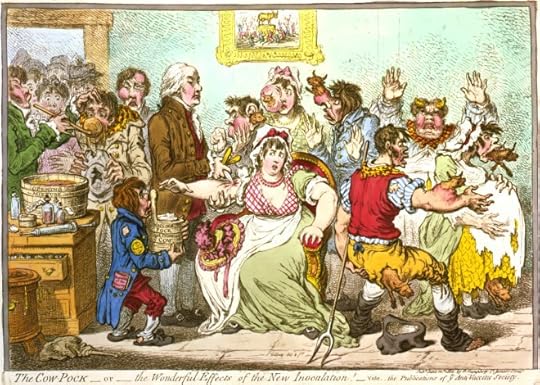
Would people inoculated with cowpox become cows? The cartoonist James Gillray lampooned the fear.
I’ve been looking back over 250 years of growing knowledge about the human body, the ills that befall us, and how to treat them. In her book Smallpox, Syphilis, and Salvation, Sheryl Persson points out that the idea of curing disease is a very new one. For most of history, and for many illnesses even today, physicians have treated symptoms and tried to keep the body alive long enough for it to cure itself.
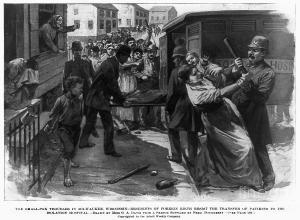 As for eradicating a disease, we’ve managed to get rid of one, and it took us 180 years from the time a country doctor in England first published a pamphlet suggesting not just the possibility, but the method.
As for eradicating a disease, we’ve managed to get rid of one, and it took us 180 years from the time a country doctor in England first published a pamphlet suggesting not just the possibility, but the method.
How can we who live in the West in the 21st Century imagine a society where a single illness killed one tenth of the population every year? Where a quarter of the entire population was killed or permanently scarred by that same illness?
Smallpox was no respecter of persons, killing kings and street beggars alike. It was responsible for one out of every three deaths in childhood at a time when a third of children died before they were nine.
It changed the course of history several times, contributing to the fall of Rome, altering the succession of the British throne and ushering in the Georgian era, killing the rulers of the Aztec and Incan nations and crippling their nations so the conquistadors could sweep all before them… The list goes on and on.
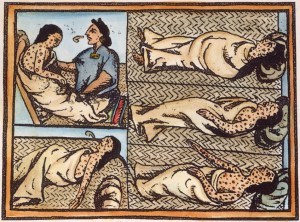
Death among the Mezo-Americans
By the middle of the 18th century, England had learned the practice of variolation; fundamentally, the practice of rubbing a cut or scratch with material from a smallpox scab to give a healthy person a case of smallpox. As long as the person administering the treatment avoided both of the two major risks, the person had a far better chance of surviving the disease, and then they wouldn’t catch it again.
The risks? Doctors tried to find milder strains of smallpox by looking for people who were recovering, but sometimes they got it wrong. And—without a germ theory of disease transmission—some of them weren’t that careful about washing their instruments (or even their hands) between patients. Variolation was common during a smallpox epidemic, and doctors carried contagion from their dying patients to their well ones.
George III of England lost two infant sons to variolation within six months of one another. Still, a death rate of less than one in fifty was an improvement over the status quo.
A physician inspects the growth of cowpox on a milking maid’
Credit: Wellcome Library, London. Wellcome Images, http://wellcomeimages.org
Edward Jenner, the country doctor I mentioned, drew on folklore to find a better way. While not the first to inoculate healthy patients with cowpox, he was the first to press his treatment on the medical community. Cowpox was a related disease, seldom fatal or even serious, and country folk had long known that milkmaids were immune to smallpox.
When, in 1796, Jenner inoculated his gardener’s son with cowpox taken from a local milkmaid, he founded the science of vaccination, and took the first step in the long road to the last natural case of smallpox, a hospital cook in Somalia in 1977.
I’ve been reading about illnesses and deaths in the 18th and 19th centuries, and about medical knowledge, for some of my books. In A Raging Madness, (Book 2 of the The Golden Redepennings) the hero is crippled after being hit by a canister shell (today we’d call it shrapnel) and the heroine is a doctor’s daughter and was her father’s apprentice. In the Mountain King series, the next book after The Bluestocking and the Barbarian is The Hermit and the Healer. My healer takes on a cholera epidemic at a girls’ boarding school, and needs to deal with the prejudice of the locals as well as the suspicion and anger of the reclusive parent of one of the girls.
I have one of my regular background characters dying of syphilis (the great pox—more about the medical history of that scourge next week).
And I’m still working out what will kill Mia Redepenning’s husband’s Javanese wife so that Mia can finally have her happy ending in Unkept Promises, Book 4 of The Golden Redepennings. (Something lingering, so she has time to send a letter halfway around the world to her English ‘sister wife’ to beg Mia to be a mother to her four little children.)
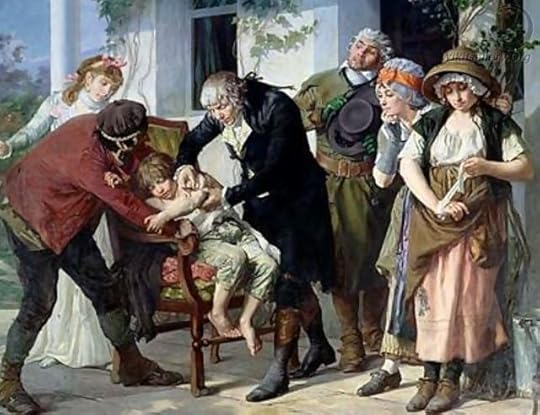
The first vaccination










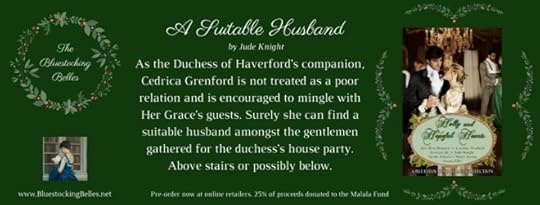


![A physician inspects the growth of cowpox on a milking maid' Credit: Wellcome Library, London. Wellcome Images images@wellcome.ac.uk http://wellcomeimages.org A physician inspects the growth of cowpox on a milking maid's hand while a farmer (?) passes another physician a lancet. Coloured etching, c. 1800. Published: [ca. 1800]](https://i.gr-assets.com/images/S/compressed.photo.goodreads.com/hostedimages/1476551286i/20856482.jpg)



